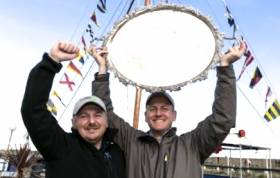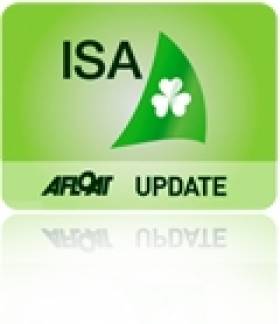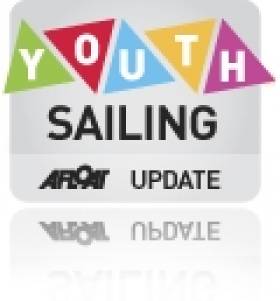Displaying items by tag: All Ireland Championships
Michael O’Connor is Sailor of the Month for October
Michael O’Connor of Royal St George YC is “Sailor of the Month (Senior)” for October after emerging as the 73rd All-Ireland Champion Helm after a ding-dong two-day final raced in Flying Fifteens from the National Yacht Club on October 5th & 6th. No stranger to success, O’Connor was the Corinthian Champion in the SB20 Worlds in Cowes in 2017, and this year he secured his place in the all-Ireland with victory in the SB20 Nationals at the RIYC.
David Taylor is Sailor of the Month (Special Award) for October
Every keen helmsperson needs a Davy Taylor as his or her right-hand man when the chips are down. down. In 2013 he was there to help Ben Duncan win the All-Ireland in ISA J/80s, then, in 2019 he was the efficient and essential presence to get Michael O’Connor over the line as the 73rd All Ireland Champion, and he gets the October Special Award by popular acclaim.
Rowers Set for Coastal Rowing Championships
#Coastal Rowing: The inaugural Irish Coastal Rowing Championships will take place this Saturday and Sunday, August 18th and 19th at the National Rowing Centre in Farran Wood, Cork. Clubs from all four provinces are set to compete.
Eddie Farr, chair of the Coastal Championships Committee, said: “This is an incredibly proud moment in all our rowing lives, to at last get to row at our national and international rowing venue.”
The Championships, hosted by Rushbrooke Rowing Club, will see clubs race in over 30 different race categories, ranging from Under 12 to Masters, with race lengths ranging from 800 to 2,300 metres. Several thousand rowers and spectators are expected to attend the two day Championships.
The long-standing All Ireland Coastal Rowing Championships will also be held this weekend, from Friday to Sunday (August 17th to 19th) in Wexford. There will be an array of races in one-design Celtic boats, Currachs, East coast Skiffs, Wexford cots, Kerry four-oars, Donegal skiffs and Seine boats.
SB20 Champ Lifts All Ireland Title in Single Day Championship off Howth
#allirelandsailing – Racing under the shadwo of a gale warning SB20 champion Ben Duncan has been crowned All Ireland Sailing Champion after a single day seven race regatta in changeable conditions at Howth Yacht Club this afternoon. Full results downloadable below as a jpeg file. Second was junior champion Seafra Guilfoyle. Flying fifteen champion Ian Mathews was third.
The day began with the 16 class representatives and their crew being split in to two eight boat fleets. Due to the forecast weather conditions for Sunday, the decision was made to sail two races in each fleet in the morning with the top four teams from each progressing to the Final Series which would take place in the afternoon. Sailing in the Irish Sailing Association's J80 keelboats, the first eight teams took to the water for a 10.30am start in a 15 knot south-westerly.
Leading the fleet in the first race was SB20 champion Ben Duncan who took the bullet followed byMatthews from the National Yacht Club in Dun Laoghaire and John McGuinness from Moville in Donegal. It was local Howth Yacht Club sailor Cillian Dickson who took the win in the second race followed by Ben Duncan with Ian Matthews in third.
On a total of 3 points, Ben Duncan and crew Joe Turner and Davie Taylor were the overall winners of the first fleet earning their place in the afternoon's Final Series. Also progressing to the Final were Ian Matthews (5 points), Cillian Dickson (6 points) and John McGuinness (8 points).
Facilitated by an on-the-water changeover, the second eight teams began racing almost immediately as strong winds were forecast for the early afternoon. Fireball sailor Noel Butler took the first win followed by a third in the second race, securing his place in the final. Also moving forward was Colin Byrne from Dun Laoghaire with two second place finishes and tied on 4 points with Noel Butler. Finishing third overall in the fleet on 5 points was teenager Séafra Guilfoyle who was invited to the championships upon winning the Junior event last month in Cork. And the sailor taking the last place in the Final Series was Trevor Kirkpatrick from Carrickfergus with a total of 8 points.
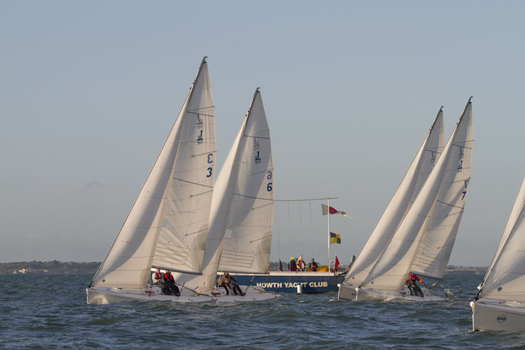
J80 fleet start during the ISA senior all Ireland championship 2013 hosted by Howth yacht club Dublin
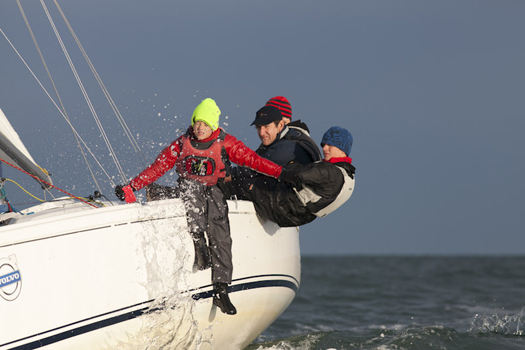
Seafra Gulfoyle from the Royal Cork Yacht Club with crew members Dylan O'Grady Patrick Crosbie Nick Walsh won the final race of the ISA All Ireland sailing championships and secured 2nd overal for the event which was hosted by Howth yacht club in Dublin.Crew member Dylan O'Grady (nearest) was the youngest competitor at just 11 years of age.
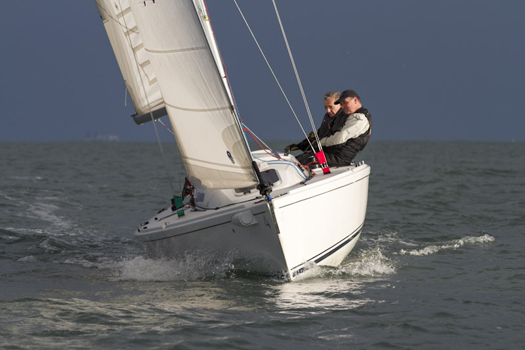
Ian Matthews of the National yacht club Dun Laoghaire crewed by Keith Poole and Nial Meagher finished third overall in the ISA Irish senior all Ireland championships hosted by Howth Yacht Club Dublin.
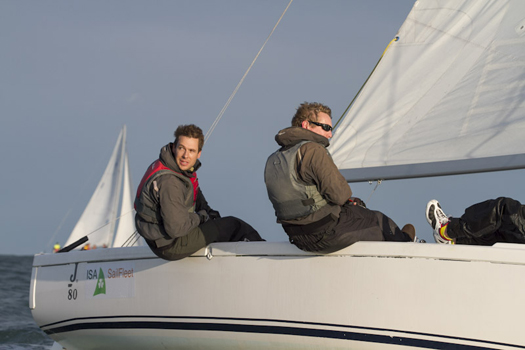
Overall winner of the Irish senior all Ireland championship Ben Duncan his crew Joe Turner/Davie Taylor work hard upwind during the event hosted by Howth yacht club Dublin.
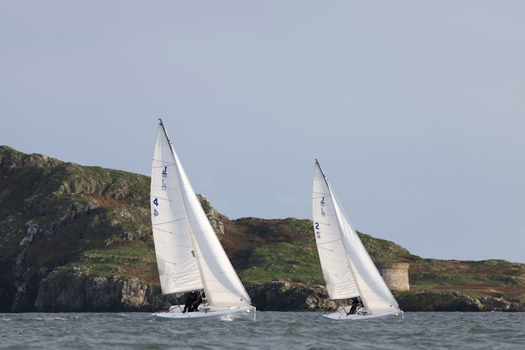
J80's sailing close to Ireland eye during the ISA senior all Ireland championship 2013 hosted by Howth yacht club Dublin.
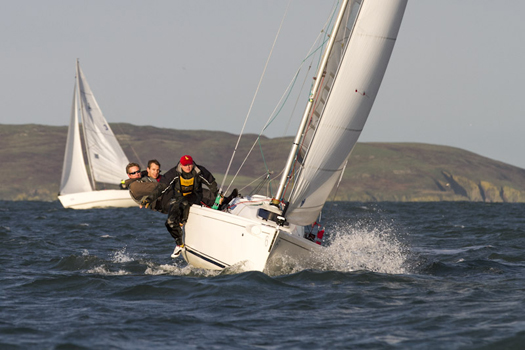
Ben Duncan ISA Irish senior all Ireland champion 2013
All sailors returned to the shore after the fleet racing had finished as the wind had picked up to almost 30 knots. After a two hour break and the boat draw racing resumed at 3.55pm. Three final races were successfully completed in 8 knots but after the second race Ben Duncan had the championship in the bag. He went on to win two of the three races and placed second in the other winning the event on a total of 5 points with a four point lead. In second place was young Séafra Guilfoyle who won the last race of the regatta and finished on a total of 9 points. Séafra also had the youngest crew member of the event on his team, Dylan O'Grady who is only 11 years old. Bronze went to Ian Matthews who finished on 12 points.
All Ireland Sailing Championships Postponed Again Due to Weather
Following a meeting with the PRO and club Sailing Manager the conclusion was reluctantly reached that sailing would not be possible tomorrow (Saturday 26th). Weather forecasts for Saturday are predicting winds 30/40 knots, this is well in excess of the safe limit for the fleet of boats being provided by RSGYC. Met Eireann have Gale Warnings in effect for the weekend.
From Met.ie...
Outlook for a further 24 hours until 0600 Sunday 27 November 2011: Gale or strong gale force south to southwest winds veering west to northwest overnight. Rain or showers, heavy at times.
The decision is to POSTPONE the regatta until Saturday December 3rd as the winds seem to moderate from the middle of the week.
A change to the Notice of Race will be made to this effect.
Nicholas O'Leary Produces Hat Trick in All Ireland Re Run
The All Ireland Championships at Kinsale today turned out in the end to be an event well worth the long wait and provided thrilling competition from start to finish writes Claire Bateman. It was sailed in a three metre swell between the Bullman Buoy and Sandycove. It was particularly difficult for the Race Committee under PRO David O'Brien in the continuous undulating swell.

Nicholas and his winning crew Adam McCarthy and Alex Barry in Kinsale this afternoon. Photo: Bob Bateman. More photos on the gallery HERE
After four races the Race Committee were calculating the results only to find that they had three Royal Cork crews tied on five points each including the twice previous holder Nicholas O'Leary, his father Anthony and Niall Kenefick who was sailing with his two sons David and George. And so the competition went down to the wire with the result dependant on the final race. Nicholas O'Leary triumphed taking his third consecutive Championship win, the first ever to do so, followed by Anthony O'Leary in second place and Niall Kenefick taking third place.
This exceptional result finally puts to bed any previous suggestions that local knowledge could prevail in the results by the competition taking place in the home club of the winner.
In his acceptance speech Nicholas said it was very difficult in the first race today to have to protest his father who was coming in on port to the mark but with a twinkle in his eye said it had to be done!
After it was all over one wag suggested to Nicholas that he should now seek to keep the trophy as he had won it three times in a row. The reply should be rather interesting!
Speaking at the reception afterwards the ISA said the three year sponsorship had now expired so they will be looking for new sponsors but such was their confidence in the continuance of the fleet they have already ordered new sails.
Results:
1. Nicholas O'Leary
2. Anthony O'Leary
3. Niall Kenefick
4. Garrett May
5. James Espey
6. Nick Walsh
7. Niall Henry
8. Ewen Barry


























